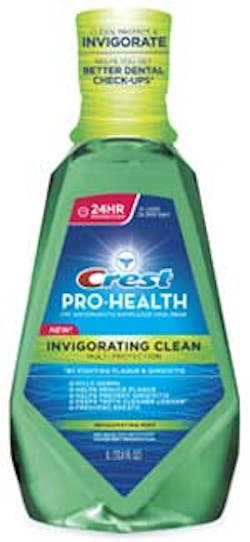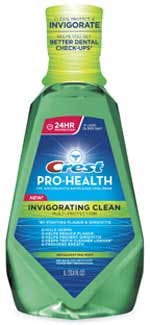Cetylpyridinium chloride reduces plaque, calculus
By Maria Perno Goldie, RDH, MS
Cetylpyridinium chloride (CPC) is a quaternary compound that reduces plaque and calculus. It is a cationic surface-active agent and has a broad antimicrobial spectrum, and kills gram-positive pathogens and yeast. (Scheie Aa. Modes of action of currently known chemical antiplaque agents other than chlorhexidine. Dent Res 1989; 68: 1609–1616.). Contact with bacteria occurs by the disturbance of the cell membrane, inhibition of cell function, seepage of cell contents, and eventually cell death. This article will be a brief review of CPC.In 2005 a study about a new product was published (Witt J, Ramji N, Gibb R, Dunavent J, Flood J, and Barnes J. Antibacterial and Antiplaque Effects of a Novel, Alcohol-Free Oral Rinse with Cetylpyridinium Chloride. The Journal of Contemporary Dental Practice, Volume 6, No. 1, February 15, 2005. www.jaypeejournals.com/eJournals/ShowText.aspx. Accessed August 31, 2011). The study discusses that CPC was one of only three antimicrobial systems to be classified as safe and efficacious for the treatment of plaque-induced gingivitis, along with stannous fluoride and essential oils. This was when they were formulated within a concentration range of 0.05 and 0.10%, by the FDA Plaque Subcommittee following a six year review of over 40 active ingredients. The study reviews results from an in vitro pre-clinical study and an in vivo clinical study evaluating the antibacterial and antiplaque benefits a new CPC rinse technology. The study results support the antibacterial and antiplaque benefits of 0.07% CPC rinse (Crest Pro-Health Rinse). The CPC rinse showed significant antiplaque benefits in vivo, reducing plaque on brushed surfaces by 39% and on non-brushed surfaces by 25% versus placebo. These benefits were shown to be comparable to those provided by a positive control, essential oils mouthrinse. This study is available free online.
Cetylpyridinium chloride (CPC) is a quaternary compound that reduces plaque and calculus. It is a cationic surface-active agent and has a broad antimicrobial spectrum, and kills gram-positive pathogens and yeast. (Scheie Aa. Modes of action of currently known chemical antiplaque agents other than chlorhexidine. Dent Res 1989; 68: 1609–1616.). Contact with bacteria occurs by the disturbance of the cell membrane, inhibition of cell function, seepage of cell contents, and eventually cell death. This article will be a brief review of CPC.In 2005 a study about a new product was published (Witt J, Ramji N, Gibb R, Dunavent J, Flood J, and Barnes J. Antibacterial and Antiplaque Effects of a Novel, Alcohol-Free Oral Rinse with Cetylpyridinium Chloride. The Journal of Contemporary Dental Practice, Volume 6, No. 1, February 15, 2005. www.jaypeejournals.com/eJournals/ShowText.aspx. Accessed August 31, 2011). The study discusses that CPC was one of only three antimicrobial systems to be classified as safe and efficacious for the treatment of plaque-induced gingivitis, along with stannous fluoride and essential oils. This was when they were formulated within a concentration range of 0.05 and 0.10%, by the FDA Plaque Subcommittee following a six year review of over 40 active ingredients. The study reviews results from an in vitro pre-clinical study and an in vivo clinical study evaluating the antibacterial and antiplaque benefits a new CPC rinse technology. The study results support the antibacterial and antiplaque benefits of 0.07% CPC rinse (Crest Pro-Health Rinse). The CPC rinse showed significant antiplaque benefits in vivo, reducing plaque on brushed surfaces by 39% and on non-brushed surfaces by 25% versus placebo. These benefits were shown to be comparable to those provided by a positive control, essential oils mouthrinse. This study is available free online.
Crest Pro-Health Rinse product does not contain alcohol. Alcohol has an extensive history of safety when used in products as recommended, for the vast majority of the population. (Riep BG, Bernimoulin JP, Barnett ML. Comparative antiplaque effectiveness of an essential oil and an amine fluoride/stannous fluoride mouthrinse. J Clin Periodontol 1999; 26:164-168). However, certain individuals may not be able to tolerate alcohol-containing mouthrinses for a variety of reasons, and we have choices available to recommend to our patients. The standards for the concentration and bioavailability of CPC were put in place because the effectiveness of CPC may be affected by other ingredients in the product, whether those ingredients are active or inert. (Jenkins S, Addy M, Wade W, Newcombe RG. The magnitude and duration of the effects of some mouthrinse products on salivary bacteria counts. J Clin Periodontol. 1994; 21:397-401). Some components added to rinses have the ability to bind CPC, causing it to be less effective. One study showed discrepancies in the availability of CPC and chlorhexidine in some mouthrinse products. (S. Sheen and M. Addy. Which mouthrinses are the most effective at plaque prevention? Br Dent J 2003; 194: 207-210). This is important, as it may have an effect on the potential of some rinses to provide the expected plaque inhibitory activity.Products containing CPC are generally considered to be safe, when used as recommended. Side effects of CPC are usually mild, and may include staining of the teeth and tongue. In a meta analysis of eight studies, only one study reported that that the staining was significant in any way. The same systematic review stated that the existing evidence supports that CPC containing mouth rinses provide a small but significant additional benefit in reducing plaque accumulation and gingival inflammation, when used as adjuncts to either supervised or unsupervised oral hygiene. (Haps S, Slot DE, Berchier CE, and Van der Weijden GA. The effect of cetylpyridinium chloride-containing mouth rinses as adjuncts to toothbrushing on plaque and parameters of gingival inflammation: a systematic review. Int J Dent Hygiene 6, 2008; 290–303). In a review of this meta analysis, strengths and weaknesses were highlighted. (Powell LV. Cetylpyridinium chloride-containing mouthwashes may provide additional benefits for gingival health. ADA Center for Evidence-Based Dentistry. ebd.ada.org/SystematicReviewSummaryPage.aspx. Accessed August 31, 2011). The conclusion was that the weighted mean difference between the test and control treatment at endpoint was significant in favor of CPC for plaque scores and gingivitis in studies greater or equal to four weeks' duration. According to the reviewer, patients unable to attain sufficient plaque removal with routine brushing and self care may benefit by the addition of a CPC-containing mouth rinse to their oral care regimen.For more information on research on CPC products, a special issue of the American Journal of Dentistry, visit www.amjdent.com/Archive/2005/July%2005%20SI%20-%20Press.pdf.For more information on CPC products, visit www.crestprohealth.com/.
Maria Perno Goldie, RDH, MS
To read previous articles in RDH eVillage FOCUS from 2011 written by Maria Perno Goldie, go to articles.


